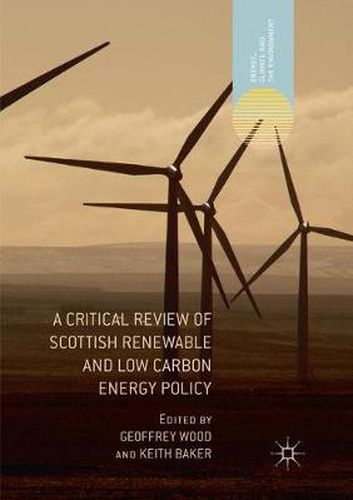Readings Newsletter
Become a Readings Member to make your shopping experience even easier.
Sign in or sign up for free!
You’re not far away from qualifying for FREE standard shipping within Australia
You’ve qualified for FREE standard shipping within Australia
The cart is loading…






This book offers comprehensive coverage of current energy policy in Scotland focussing on non-fossil fuel energy options: renewables, nuclear power and energy efficiency. Covering issues of policy and practice, planning, legislation and regulation of a range of sustainable energy technologies in the context of devolved government, key experts explore these issues in terms of the ongoing Scottish independence debate, Brexit and further devolution in this vitally important and timely book.
The book emphasises two further distinctive areas: constitutional change and the role of sub-national authorities in renewable and low carbon energy policy and practice. The clear focus on renewable and low carbon energy policy and practice and sub-national authority level of governance of energy means that it will be of particular relevance as a case study for those countries either in the process of deploying renewable and/or low carbon energy technologies or looking to do so. The authors discuss the many lessons to be learnt from the Scottish and UK experience.
By providing a critical analysis of Scottish renewable and low carbon energy policy and practice, this book is invaluable to students, practitioners and decision-makers interested in renewable and low carbon energy transitions, energy planning and policy.
$9.00 standard shipping within Australia
FREE standard shipping within Australia for orders over $100.00
Express & International shipping calculated at checkout
This book offers comprehensive coverage of current energy policy in Scotland focussing on non-fossil fuel energy options: renewables, nuclear power and energy efficiency. Covering issues of policy and practice, planning, legislation and regulation of a range of sustainable energy technologies in the context of devolved government, key experts explore these issues in terms of the ongoing Scottish independence debate, Brexit and further devolution in this vitally important and timely book.
The book emphasises two further distinctive areas: constitutional change and the role of sub-national authorities in renewable and low carbon energy policy and practice. The clear focus on renewable and low carbon energy policy and practice and sub-national authority level of governance of energy means that it will be of particular relevance as a case study for those countries either in the process of deploying renewable and/or low carbon energy technologies or looking to do so. The authors discuss the many lessons to be learnt from the Scottish and UK experience.
By providing a critical analysis of Scottish renewable and low carbon energy policy and practice, this book is invaluable to students, practitioners and decision-makers interested in renewable and low carbon energy transitions, energy planning and policy.